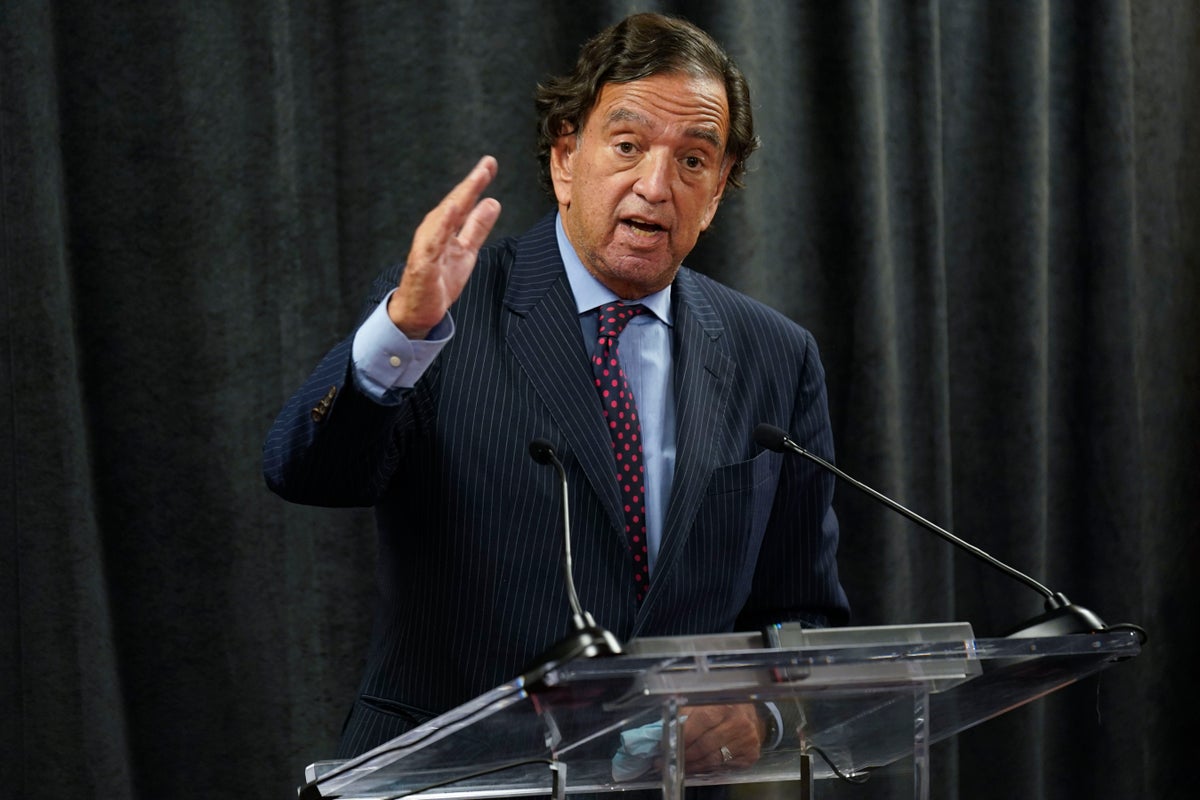
Bill Richardson, a two-term Democratic governor of New Mexico and a U.S. ambassador to the United Nations who dedicated his post-political career to working to free Americans detained overseas, has died. He was 75.
The Richardson Center for Global Engagement, which he founded and led, said in a statement Saturday that he died in his sleep at his home in Chatham, Massachusetts.
“He lived his entire life in the service of others — including both his time in government and his subsequent career helping to free people held hostage or wrongfully detained abroad,” said Mickey Bergman, the center's vice president. "There was no person that Gov. Richardson would not speak with if it held the promise of returning a person to freedom. The world has lost a champion for those held unjustly abroad and I have lost a mentor and a dear friend.”
Before his election in 2002 as governor, Richardson was U.N. ambassador and energy secretary under President Bill Clinton and served 14 years as a congressman representing northern New Mexico.
Richardson also traveled the globe as an unofficial diplomatic troubleshooter, negotiating the release of hostages and American servicemen from North Korea, Iraq, Cuba and Sudan. He bargained with a who’s who of America’s adversaries, including Iraqi dictator Saddam Hussein. It was a role that Richardson relished, once describing himself as “the informal undersecretary for thugs.”
Armed with a golden resume and wealth of experience in foreign and domestic affairs, Richardson ran for the 2008 Democratic nomination for president in hopes of becoming the nation’s first Hispanic president. He dropped out of the race after fourth place finishes in the Iowa caucuses and New Hampshire primary.
Richardson was the nation’s only Hispanic governor during his two terms. He described being governor as “the best job I ever had.”
“It’s the most fun. You can get the most done. You set the agenda,” Richardson said.
As governor, Richardson signed legislation in 2009 that repealed the death penalty. He called it the “most difficult decision in my political life” because he previously had supported capital punishment.
Other accomplishments as governor included $50,000-a-year minimum salaries for the most qualified teachers in New Mexico, an increase in the state minimum wage from $5.15 to $7.50 an hour, pre-kindergarten programs for 4-year-olds, renewable energy requirements for utilities and financing for large infrastructure projects, including a commercial spaceport in southern New Mexico and a $400 million commuter rail system.
Richardson continued his freelance diplomacy even while serving as governor. He had barely started his first term as governor when he met with two North Korean envoys in Santa Fe. He traveled to North Korea in 2007 to recover remains of American servicemen killed in the Korean War. In 2006, he persuaded Sudanese President Omar al-Bashir to free Pulitzer Prize-winning American journalist Paul Salopek.
Richardson transformed the political landscape in New Mexico. He raised and spent record amounts on his campaigns. He brought Washington-style politics to an easygoing western state with a part-time Legislature.
Lawmakers, both Republicans and Democrats, complained that Richardson threatened retribution against those who opposed him. Democratic state Sen. Tim Jennings of Roswell once said Richardson was “beating people over the head” in his dealings with lobbyists on a health care issue. Richardson dismissed criticisms of his administrative style.
“Admittedly, I am aggressive. I use the bully pulpit of the governorship,” Richardson said. “But I don’t threaten retribution. They say I am a vindictive person. I just don’t believe that.”
Longtime friends and supporters attributed Richardson’s success partly to his relentlessness. Bob Gallagher, who headed the New Mexico Oil and Gas Association, said if Richardson wanted something done then “expect him to have a shotgun at the end of the hallway. Or a ramrod.”
After dropping out of the 2008 presidential race, Richardson endorsed Barack Obama over Hillary Clinton. That happened despite a long-standing friendship with the Clintons.
Obama later nominated Richardson as secretary of commerce, but Richardson withdrew in early 2009 because of a federal investigation into an alleged pay-to-play scheme involving his administration in New Mexico.
Months later, the federal investigation ended with no charges against Richardson and his former top aides. Richardson had a troubled tenure as energy secretary because of a scandal over missing computer equipment with nuclear weapons secrets at Los Alamos National Laboratory and the government’s investigation and prosecution of former nuclear weapons scientist Wen Ho Lee.
Richardson approved Lee’s firing at Los Alamos in 1999. Lee spent nine months in solitary confinement, charged with 59 counts of mishandling sensitive information. Lee later pleaded guilty to one count of mishandling computer files and was released with the apology of a federal judge.
William Blaine Richardson was born in Pasadena, California, but grew up in Mexico City with a Mexican mother and an American father who was a U.S. bank executive.
He attended prep school in Massachusetts and was a star baseball player. He later went to Tufts University and its graduate school in international relations, earning a master’s degree in international affairs.
Richardson moved to New Mexico in 1978 after working as a Capitol Hill staffer. He wanted to run for political office and said New Mexico, with its Hispanic roots, seemed like a good place. He campaigned for Congress just two years later — his only losing race.
In 1982, he won a new congressional seat from northern New Mexico that the state picked up in reapportionment. He resigned from Congress in 1997 to join the Clinton administration as U.N. ambassador and became secretary of energy in 1998, holding the post until the end of the Clinton presidency.







